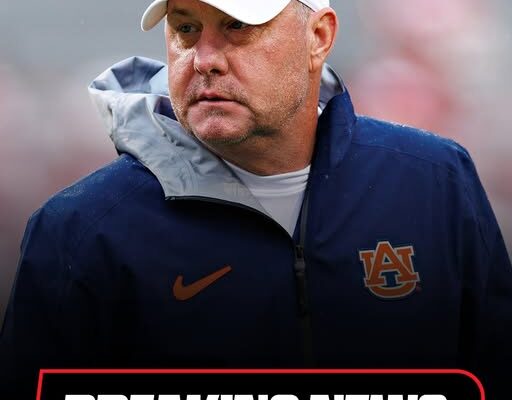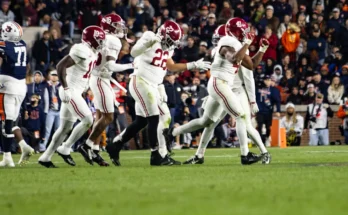Breaking: Auburn has fired coach Hugh Freeze, sources tell Pete Thamel.
A stunning development has shaken the college football world as Auburn University has reportedly fired head coach Hugh Freeze, according to sources close to Pete Thamel. The decision, which comes after weeks of mounting pressure, mixed results, and growing internal tension, marks yet another chapter in Auburn’s tumultuous coaching history. Freeze, who was brought in with hopes of restoring Auburn to national prominence, now departs amid disappointment, fan frustration, and questions about the program’s long-term direction.
When Hugh Freeze was hired at Auburn, there was a sense of cautious optimism. The university believed it had found a coach capable of revitalizing the Tigers’ offense, competing with the SEC’s elite, and bringing a fresh identity to the Plains. Freeze arrived with a reputation for offensive innovation and had previously shown at Ole Miss that he could recruit and win against powerhouse programs like Alabama and LSU. However, from the beginning, his tenure at Auburn was under the microscope. The Tigers, a program with passionate fans and sky-high expectations, demand immediate success, and in the unforgiving world of SEC football, patience is often in short supply.
As the 2025 season unfolded, Auburn’s inconsistency became impossible to ignore. Freeze’s offense, once considered dynamic and creative, sputtered against top-tier opponents. The Tigers struggled to find rhythm under center, and despite glimpses of potential from young talent, the overall execution never met expectations. Fans who had once embraced Freeze’s promise of explosive football began to grow restless as the team’s record slipped below .500 and the offense ranked near the bottom of the conference. In a league defined by precision, discipline, and relentless competition, Auburn looked increasingly adrift.
Behind the scenes, there were growing signs of tension between Freeze and the university’s administration. Sources indicated disagreements about recruiting strategies, staff decisions, and the direction of player development. While Freeze had advocated for a more flexible approach in pursuing high-upside recruits, Auburn’s leadership reportedly wanted more focus on proven, ready-to-play prospects who could contribute immediately. This philosophical divide created friction that only worsened as the losses mounted. The once unified vision of building Auburn back into an SEC contender began to fracture, leading to difficult conversations and ultimately, an irreversible decision.
Freeze’s dismissal also reflects the harsh reality of modern college football, where the margin for error is razor-thin and results are everything. In the NIL and transfer portal era, success is measured not only by wins but by the ability to manage player movement, locker-room culture, and fan engagement. Auburn’s boosters and administration, known for their high standards and influence, reportedly lost confidence that Freeze could deliver sustainable progress. The timing of the firing—so early in the program’s rebuilding phase—underscores the urgency Auburn feels to keep pace with rivals like Alabama, Georgia, and LSU, who continue to dominate the national landscape.
The Hugh Freeze era at Auburn will likely be remembered as a bold but ultimately short-lived experiment. Freeze arrived with the goal of redemption, seeking to reestablish himself among the SEC’s coaching elite after previous controversies at Ole Miss. For a time, it appeared that he had turned the page, demonstrating maturity, humility, and a renewed commitment to the game. But the same challenges that have plagued Auburn’s football program for over a decade—instability, pressure from boosters, and the relentless demand for championships—proved too powerful to overcome.
Players, meanwhile, are left to process the fallout. Many of them bought into Freeze’s system, believing his leadership could steer them toward contention. For the younger athletes, this marks yet another coaching change in a program that has seen far too many transitions in recent years. Continuity, essential to building a winning culture, remains elusive. Recruiting could also take a hit in the short term, as uncertainty around the coaching staff and system often leads prospects to reconsider their commitments. For Auburn, maintaining stability in the locker room during this transition will be a crucial challenge in the weeks ahead.
The next step for Auburn is both obvious and complicated: finding a replacement capable of not only winning games but restoring belief. The search for a new head coach will undoubtedly attract national attention, as Auburn remains one of the most prestigious and high-pressure jobs in college football. Names like Lane Kiffin, Mike Norvell, and Jamey Chadwell will likely surface in speculation, along with rising coordinators eager for their first big opportunity. Whoever takes over will inherit a talented but inconsistent roster, a passionate fan base, and a university that expects nothing less than excellence.
For Freeze, this firing represents another difficult chapter in a career defined by both brilliance and controversy. His ability to design creative offenses and connect with players has never been questioned, but sustaining success in a high-intensity environment like the SEC has once again proven elusive. Whether he will seek another head coaching opportunity or step back from the spotlight remains to be seen. Given his track record, it would not be surprising if another program eventually takes a chance on him, but for now, the Auburn experiment stands as a cautionary tale about the volatility of coaching at the highest level.
The reaction among Auburn fans is mixed. Some express disappointment, believing Freeze deserved more time to fully implement his system and develop his recruits. Others, however, see the move as necessary, arguing that the team showed little progress and that decisive action was required before the program fell further behind. Social media has been flooded with debate, frustration, and speculation, reflecting both the emotional connection fans have to their team and the deep divisions that can arise when expectations are unmet.
In the coming days, Auburn’s administration will hold press conferences, issue statements, and attempt to frame the decision as a forward-looking move. Athletic Director John Cohen will face questions about the timing and reasoning behind the firing, as well as about the process of finding the next leader of the Tigers. Financially, the decision carries weight too — Freeze’s contract reportedly included a significant buyout clause, meaning Auburn will owe millions as part of the separation. But for a program determined to win at any cost, that appears to be a price they are willing to pay.
In the broader context of the SEC, Freeze’s firing is another reminder of how unforgiving the conference can be. Even coaches with strong résumés and reputations can find themselves out of a job within a few seasons if the wins don’t come fast enough. The relentless competition and the constant pressure from fans, boosters, and media make the SEC both the pinnacle and the proving ground of college football coaching careers. Auburn, once again, finds itself in the familiar position of starting over, searching for stability in a landscape that rarely allows for it.
As the sun sets on Hugh Freeze’s time at Auburn, one thing remains certain: the passion surrounding Auburn football is as fierce as ever. The program’s fans, players, and alumni will rally once again, as they always do, holding onto hope that the next chapter brings success worthy of the Tigers’ proud tradition. For now, though, Auburn stands at a crossroads—reflecting on what went wrong, preparing for what comes next, and reaffirming that in the SEC, the pursuit of greatness never truly ends.



